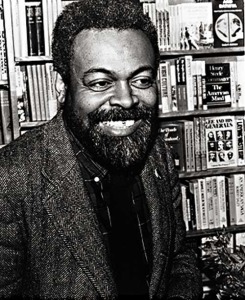
Shortly after I arrived in New York City from Detroit in 1964 to direct and act in Study in Color, by Rev. Malcolm Boyd, Amiri Baraka came to see the play at St. Mark’s Church-in-the-Bowery. After the performance, everyone went to hear the jazzman Charles Mingus at the nearby 5 Spot Jazz Club on St. Mark’s Place. It was my good fortune to meet and get to know the celebrated author of Dutchman. We had in common a close friendship with the great poet Langston Hughes.
Baraka was already an award-winning playwright, a nationally recognized poet, editor of respected literary journals (where he published unknown writers alongside such comrades as Ginsberg, Corso, Ferlinghetti, Rivers, Rexroth and Kerouac). After the success of Dutchman (produced by Edward Albee) marked him as a major playwright, Baraka moved uptown to Harlem to set up the Black Arts Repertory Theatre.
At that time, American cities were in turmoil; riots took place in Watts and Harlem, and two years later in Detroit and Baraka’s hometown of Newark, N.J. Baraka’s poetry and essays defined that unrest. As an activist, he participated in setting Black Power Conferences in Atlanta and Gary, Ind., to further define the unrest. Baraka’s image blazed on front pages of newspapers across America and fired up African Americans everywhere.
Baraka was born Everett LeRoi Jones in Newark. He left that city to go to Howard University, then left Howard a year before graduation to join the U.S. Air Force. After being discharged, he settled in Greenwich Village, where his literary output began to take serious focus.
In 1968, I began producing his plays (and also produced him as a poet for Motown Records). At the time, Baraka was too busy for the intense involvement theatre demanded, although he participated in my documentary Black Theater in America and co-edited anthologies with me. The working connection has lasted till this day. At New Federal Theatre, we are currently in development with Baraka’s play The Most Dangerous Man in America, scheduled for November 2014, to be directed by Paul Carter Harrison.
Baraka’s life and literary achievement as a playwright, poet, essayist and political activist should give us inspiration and courage, especially as African-American artists. He leaves an indelible imprint on our culture. His journey took him through adjustments, changes that are instructive to many of us who find ourselves working in an art world we do not understand—a world that does not see us as it sees Europeans, because we are not. Yet Baraka insisted that we are artists in the European/American tradition—our theatre and most of our literature are reflections of that, although our music, especially blues and jazz, are not. In his writings, he told us that we are Africans in a European culture, attempting to adjust to a system in constant change. No one knows what tomorrow will bring.
He had incredible vigor and forcefulness. I’ve seen Baraka do a two-hour poetry set with jazz musicians on many occasions, leaving the stage soaked with sweat.
Although his political views changed over the years, one set of things remained the same—his output as poet and intellectual and his respect for ideas and how those ideas were placed. He often spoke of how Shakespeare actually laid out the history of England; of how Hollywood scooped up Black Power rhetoric and gave us films like Blacula, The Werewolf from Watts, Black Caesar, in the same mold as their other films.
We who respected him and worked with him could only follow him, could only attempt to absorb some of his ideas into our own. If you followed his evolution from the Village in the mid-’50s, through jazz joints and cafés and publishing houses, to Harlem, where he denounced all the whites he had associated with up to that time (including his wife Hettie Jones), then back to NewArk where he founded the nationalist organization Committee for Unified NeWark, and then into the 1970s, when he announced he was adopting a Marxist philosophy—you might reel with confusion. But look at the incredible body of work that evolved out of this prolific, transformative writer. His claim to fame is secure.
I witnessed the respect and the admiration etched on the faces of friends assembled to pay homage at the “going home” celebration in January at Newark’s Symphony Hall. Peace be with his wife Amina Baraka; his sons Obalaji, Ras, Amiri Jr. and Ahi; and his daughters Kellie, Lisa, Dominque, Maria, Vera and Wanda.
Woodie King Jr. is artistic director of New York City’s New Federal Theatre.

